Published by Alessandro Violante on November 19, 2017
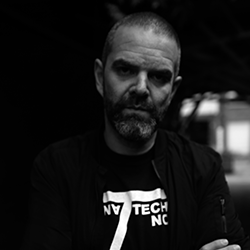 Hypnoskull is one of the pioneers of techno and industrial music mixing, active since 1993 and since 1998 one of the most important projects of Ant-Zen label. Patrick Stevens was also part of Sonar duo, one of the first so called “rhythmic noise” projects, and now he celebrates twentyfive years of career with his new album Die4.generation, following Immer Wieder Nein released approximately one year ago. In the following interview the reader will be able to find all the answers he would like to know about this project and his new releases.
Hypnoskull is one of the pioneers of techno and industrial music mixing, active since 1993 and since 1998 one of the most important projects of Ant-Zen label. Patrick Stevens was also part of Sonar duo, one of the first so called “rhythmic noise” projects, and now he celebrates twentyfive years of career with his new album Die4.generation, following Immer Wieder Nein released approximately one year ago. In the following interview the reader will be able to find all the answers he would like to know about this project and his new releases.
Hi Patrick, it’s a great pleasure to interview you on our FLUX Webzine. First of all, would you like to explain to the readers what Hypnoskull project is and what is about?
My pleasure! And that is immediately a very difficult question for which I need to go back in time. I was just 19 years old, and I clearly remember the exact moment when I came up with the name for the project. It was somewhere in June 1992 in Belgium and after I played in a few experimental bands I thought about starting a project on my own. Since I had spent all my money on buying old drumcomputers I was full of enthusiasm to start working with them and record music. So, the name and the start of the Hypnoskull project was a matter of urgency in that time. I spent the summer recording and I released a first tape as Hypnoskull, and I also played a first live show, which lasted exactly 3 minutes. Back in those days I was hugely influenced by the movement of the Dutch V2 Organisation who tried to make a connection between art and technology and who released next to music also books and manifests about the use of media in art. I visited a few of their events and read a lot of their publications and felt exactly that what I wanted to ‘say’ in my music was closely connected to their subjects. In my journalism studies after 1992 I also focused on these thematics and I graduated with a project and thesis about the use of media in art.
During all those first years I also was very deep involved in a global network of hometaping, so I got a huge input from obscure underground labels and bands from around the world, long before there was this all-‐connecting internet. Hypnoskull was always a project where I wanted to have content, provocation and messages. In my head it is not ‘just’ a music project, but a project that tries to somehow communicate with the audience, also on a non-‐musical level.
Lately you’ve been very prolific, you’ve released two albums with Ant‐Zen in approximately one year, Immer Wieder Nein and the last one, Die4.Generation, partially different but both of them interesting.
Oh yes, ever since Immer Wieder Nein I am back on a vibe which I had during the first 10 years of the project: lots of recordings and the drive to get the music and the messages ‘out there’. There were times when I hated the project, the name, the ‘legacy’ and the expectations of the audience. So I had quite some moments when I truly challenged everyone with very harsh turns and changes in music and thematics as a result. I still stand for everything I’ve done, and it became part of the project as such. The last 3 albums however, I returned to what I call ‘the roots’ of the project, which is a combination of techno and abrasive noisy experiments. It is the combination which is the closest to myself also. I started as a techno producer in 1994 on the Belgian label KK Records, even before releasing albums with Hypnoskull, so the presence of techno and violent 4/4 beats is not a coincidence.
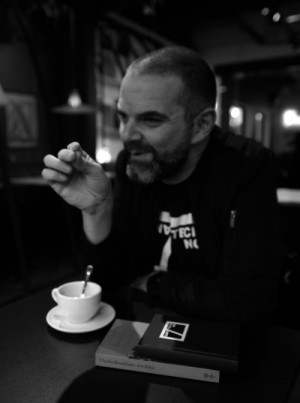 What Die4.Generation is about? What is the “fourth generation”?
What Die4.Generation is about? What is the “fourth generation”?
The new album title Die 4. Generation should be read in German as “Die vierte Generation” and it deals with the darkest pages of post-‐war Germany, namely the period which they call ‘Deutscher Herbst’ (German Autumn), when a political movement radicalized into a terror group called Rote Armee Fraktion. Since I’m half-‐German and since I’ve spent a lot of my holidays as a kid with my family in Germany the images of that Germany which was divided and in a state of emergency came all back from my unconsciousness because of the wave of terror we have nowadays in the world. I realized that ever since I was born in 1973 there was not a single moment without terror. On top of that my German family lived very close to the iron curtain and the presence of that monstrous division between the West and the East made a very big impression on me as a kid. So, when looking back, I remember as a 5 or 6 year old that the road trip from Belgium to Germany was full of military, police and checkpoints. Obviously I had no idea why and kids don’t care. I vaguely remember the news images on television, with bombed cars, people shot to pieces, and obscure, frightening videos of hostages. But we played outside and we didn’t care. Last summer I discovered that the super small village where I spent my holidays was the place where Andreas Baader spent his holidays as a kid. Also with an uncle of him. So…since the Rote Armee Fraktion ceased to exist after a so-‐called third generation of members, the provocative title ‘Die vierte Generation’ is a result of a search inside myself. I am, as a person, very sensitive to injustice and I was raised in an environment where solidarity, human rights and the respect for people whatever their background is, was very important. So, to make a long story short, I made a kind of reflection about the German Autumn and I came to the conclusion that the absolute failure of those people was the use of the same violent techniques as the ones they were fighting. In that sense the title must be read. It is a fictional ‘call’ for resistance, in a way which is non-‐violent but in the same time radical. I have no problem at all with people who are radical. But I have a problem with violence. I condemn violence with my whole heart and being. I think humanity needs radical thinkers, philosophers, artists. More than ever. Society nowadays seems to become an organized mass orgy of consumption only, and it is on every level supported by politics, media and even the educational institutes which seem to limit their tasks to ‘delivering people to the labor markets’. So yes, it is a cry for a new generation of radical thinkers, people who grab the pen instead of the machinegun.
I have here your album and there are four dates: 1970, 1975, 1982 and 1999. Each of them “tells” a story and each of them is told by the perspective of a woman. Can you help me putting together the pieces of the puzzle to better understand what you’re telling?
Those 4 years are each marking the initial dates of the ‘generations’ of the movement I put into the discussion. 1970 as the period when it all started because of indignation that former German war criminals of the third reich were getting the best positions in the corporate and political world of the new German state. Also as the start of the violent circle in 1971. 1975 as the second generation and the point-‐of-‐no-‐ return with an increase of violence by the time of 1977, the hostages, hijackings, bombings. It is very remarkable to see that in this particular period the people who once could be described as intelligent, became the fanatic killers driven by a kind of orgy of violence. 1982 and the years after, when the third generation stroke, became a kind of ‘hide and seek’ period with the German State which was by that time highly prepared and ready to deal with them on every level. I am still trying to understand what kind of phantom they were believing in, at that point. And 1999 in the end is the fictional starting point of the non-‐ existing ‘fourth generation’ after the dissolution in 1998. I titled it ‘resignation/aussenseiter’ because of the fact that I believe that true resistance starts within your own self. True resistance does not need a group, which always will become a micro-‐society with the same kind of mechanisms going on as in society itself.
This ‘new’ kind of resistance I talk about is a resistance from within, the understanding that each and everyone of us is capable to think. To make own personal decisions that lead to a better, human, free spirit. The perspective of the entire story is indeed from a female point of view since the main leading people of that movement were female. So far for all the theories that violence is always and exclusively a male issue. It’s not by coincidence that I have included that quote by the late French-‐Romanian philosopher E. M. Cioran: “after all I know that these ideas and dogmatic thoughts are wrong and absurd. At last only human beings remain, and they are what they are. I am cured of the illness, to follow any ideology.” I will always be thankful to Asmus Tietchens by the way. Because of his work I know about Cioran.
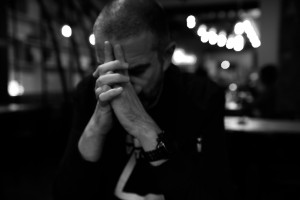 The album also features two “old” songs: one from the rehearsals of ffwd>burnout! and one partially made in 1996. Why have you chosen to put them into the album?
The album also features two “old” songs: one from the rehearsals of ffwd>burnout! and one partially made in 1996. Why have you chosen to put them into the album?
The track from the ffwd>burnout! dat tape happens to be on this album cause during the recording of Die4.Generation I was searching for the original master recordings of ffwd>burnout!. Certain tracks needed to be remastered because there will be a reissue on vinyl very soon on the great Berlin based techno label Repitch Recordings. I forgot entirely about those not used tracks, so ‘initialising procedure’, in the original form, ended on this album now. I think I could easily compile a full album with all the not used tracks of previous albums. Well, not all of them are great of course, but anyway. Initialising procedure was like rediscovering a precious treasure. I couldn’t believe I skipped it in 1997, so that is why it is on here. The ‘dead track (IV)’ is a track I made in its original form in 1996 indeed, and throughout the years I made 4 versions out of it, because of the simple fact that it stayed inside a crucial piece of gear I use ever since, a sampler. Back in the days we did not use a lot of equipment that had enough internal memory, so most of the original material is gone. Dead track remained for some strange reason. I played it in Kit kat klub in Berlin in March and decided at the spot that the new version had to be inside the album.
Some time ago I’ve seen the Facebook page “Anti/Techno”, it seemed to me very interesting. Can you explain me what is about? Recently, there’s been a rediscovery of an idea of techno closer to the Underground Resistance group. Has this something in common with what you’re doing?
I started this anti/techno project a few months ago as a kind of reaction against the trends out there that call every kind of techno with a distorted kick ‘industrial techno’. With the risk of sounding arrogant, but the entire crossover between techno and industrial simply was done by people like me and a whole bunch of others in the late nineties. Like I told before, my first releases and shows were as a techno producer.
When I started releasing on ant-‐zen with Hypnoskull it became a more prominent thing, this mix of industrial with techno, or like we called it ‘technoïd’ rhythms. Or rhythmic noise. I’m talking Hypnoskull, but as well P A L, Imminent Starvation, Noisex, Synapscape, Converter, the whole bunch. And like I said, a lot of others were also on that track. Zhark recordings and the artists on there, the magnificent reload ambient and producers like Seal Phüric, the Dutch scene with producers like RA-‐X or projects like Unit Moebius,… It was huge. And of course I love the fact that a young generation picks up that sound again. What disturbs me a bit, and that is the reason for anti/techno, is the sometimes ‘empty’ case. I mean, ‘industrial’ and ‘techno’ are in my view and opinion both genres with roots in subversion. They are ‘anti’ genres. So I see it a bit as a platform and label to revive this subversion again in this combination of genres. I know it is impossible, but I like the impossible. The whole idea that music can be almost a threat, you know. An assault. It’s time to inject some danger again. Some subversion. Some aversion against the economic machinery of the music industry which treats genres like techno as the 100th cow they can milk to earn profit.
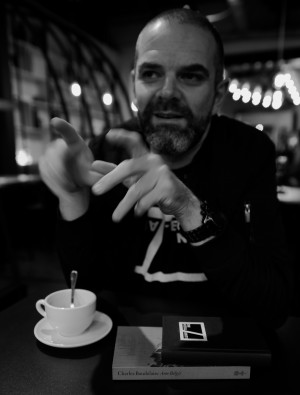 Talking about Immer Wieder Nein, of which I remember the live performance at Maschinenfest of 2016, what was the linkage between the album and Brecht? What the album was about?
Talking about Immer Wieder Nein, of which I remember the live performance at Maschinenfest of 2016, what was the linkage between the album and Brecht? What the album was about?
It was my homage to the German artistic resistance of which I consider Bertolt Brecht and his entourage the most prominent players. On the cover it also features Paul Samson Körner, the boxer with whom Brecht was friends. The album title refers to the attitude I believe is important: to question everything. Everything. It does not mean to reject everything, it means you have to think about every so called ‘truth’ and every law or rule. Nowadays too many people hide behind news facts, as if every published opinion, text, or news item is as such a ‘truth’. People don’t even question the questionable anymore. That is a tremendously dangerous evolution in society. The key track on that album, Seeräuber Jenny was my personal interpretation of that small part of the magnificent Threepenny Opera, in a kind of attempt to take the Brecht material outside of the ordinary and expectable ‘traditional’ environment of the theatre. I somehow tend to believe that Brecht would have hated that, and I do have my issues with the figure of Brecht, especially when it comes to his post-‐war position in the DDR, but he remains one of my heroes. It took me a while before I dared to touch his material and work with it, but I’m happy I’ve done it.
What are the music, and not only, influences which have contributed in shaping the Hypnoskull sound?
Tough one again, cause it’s a lot. And it’s an extremely eclectic soup of influences. On a musical level I was always attracted to everything that sounded ‘out of the ordinary’. I remember as a kid being exposed to the hits of DAF because of my older nieces and nephews in Germany, that was an ear opener. Kraftwerk also, and later on in the late eighties I got a huge influence because of the Belgian New Beat movement. Luckily I had the deepest underground tunes fed to me during that period, and not the trash. Somehow extreme music was always around too. I am talking hardcore punk, death metal and so on. I was very interested in all the hybrid forms between genres, so when all the break stuff started in the mid nineties I was very happy also. Jungle, breakcore, and so on. It’s hard when you can’t stick to one genre. There’s so much good music out there, and bizarre scenes and subcultures. I love it. It keeps it exciting. The tape scene brought me all aspects of industrial music, ranging from Dadaistic collage music all the way to the Japanese noise scene. I still have about one thousand tapes from that period, it’s a crazy, decaying pile of magnetic tape.
I’m very much into music that has a certain melancholy inside. Obviously I am also influenced by many other things. Politics, literature, philosophy, art… Cinema also. A lot of cinema. I’m also active as a cinematographer for documentary and film. The different kind. I don’t like the term ‘art house’ cause it’s much more. Hyper personal author-‐cinema, essays, that kind of stuff. There’s a huge connection between film and music for me because of that work.
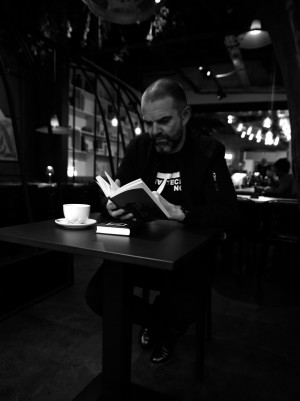 I’ve seen the album features a remix done by D. Carbone, an Italian producer. I’ve read that some years ago you played in Milan. Would you be interested in playing here again, or in Italy in general? Do you like that country?
I’ve seen the album features a remix done by D. Carbone, an Italian producer. I’ve read that some years ago you played in Milan. Would you be interested in playing here again, or in Italy in general? Do you like that country?
Davide is a great guy, a good producer and someone of that new generation who picked up our old sound. We met a few weeks ago in Berlin for the first time, but we are in contact for a while now. He and Ascion are the people who will rerelease the ffwd>burnout by the way on vinyl on their Repitch label. For some strange reason there’s a lot of great and talented Italian people around me this year. The extraordinary people from Gegen Berlin where I played thanks to A/Ona from Drone Berlin, or the crew of the Zwischenwelten events in Berlin, both events I played this year. Super energetic people. I remixed a track by the Italian producer Federico Amoroso, that was also a blast because I was in a great company of remixers on that release, Ontal, Tomohiko Sagae and Ryuji Takeuchi. I’ve played Milan a few times by the way, and also there I had amazing people around. Warm, energetic, aware people. I like that. And as an industrial producer, what could I say about the home country of mister Russolo? As a cinematographer, what could I say about the country that was the home of Pasolini? Or the place which inspired Catullus so much? Italy is about the only country I visited ‘outside’ of work also. As a regular tourist. It’s a great country that has every possible human emotion inside, it has its dark sides, it has its bright ones. It breaths history, just like Germany by the way.
If every ideology would die, how do you imagine the world would be? Do you think ideologies give some kind of “safety” to people?
Obviously it is an utopia to believe that ideologies would die. But as a pure, theoretical thought, it must be amazing. No ideologies, no dogmas, no ‘paths’ that have to be followed in order to be accepted. It would require a virtual impossible kind of awareness and morality of everyone. A basic set of attitude everyone would need to have. Obviously ideologies give a feeling of safety to most people who follow them. To a certain point that is ok, but too often the ideology takes over and people hide behind the dogmas they prescribe as ‘the one and only good’. Throughout history a lot of blood was shed because of that. I can’t follow any ideology anymore, and I can’t understand any surreal idea about being ‘a people’ in a nation for example. All these things are close to impossible to understand for me. I often have the feeling that people hide their emptiness behind a ‘pride’ about their nation or people. I try to encourage myself and the people around me to think. I truly believe that this capacity to think is the only possible way to be free from ideology.
What is the song Excess, Ekstase, Depression” about?
It’s about the ‘orgy of violence’ I was talking about. The excess, the overload of violence up to the moment when it becomes ecstatic, and always, always followed by severe depression when the misery it caused is revealing. It’s a returning pattern with most violent criminals, terrorists and even freedom fighters.
Violence always leaves irreparable marks on the soul.
In which measure mostly instrumental electronic music can deliver some particular messages to people more than others? I imagine people buying, for example, the digital version of the album and not documenting about what you’ve written in the notes, etc. Do you think they could clearly understand what you’re saying?
I think the digital release also comes with a digital booklet, but I’m not sure indeed if people read and try to grasp the ideas behind it. As such, I don’t mind. I mean, the music can also be on its own. It is intense, I hope also threatening enough, at least it is from my perspective. Sometimes I have discussions after a show with people, one-‐on-‐one. People who are confused and want to know exactly what I mean by showing certain images for example. It’s of course also a far past for young people of let’s say 25 years old. So I never avoid these discussions, on the contrary, it is satisfying. As long as people question things, and are willing to exchange views and opinions in an open dialogue, as long as that is possible, I’m fine. Beware for the moment when it is not possible, or doesn’t happen anymore.
Thanks a lot for your time! If you want, greet our readers!
With pleasure, it’s great to see there are still music media that dare to dig deeper into the background of the music, all my respect! To the readers: Keep on saying ‘no’.
Patrick Stevens, November 8th 2017, Belgium.

